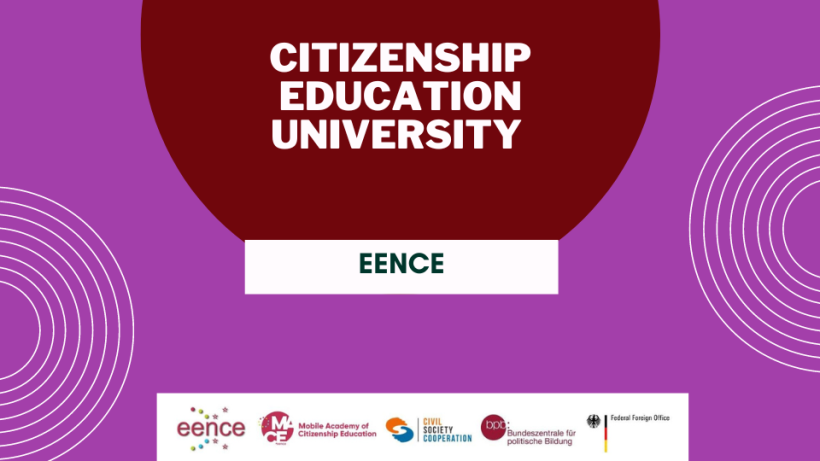Creating the EENCE Citizenship Education University. Join us!
Citizenship education remains one of the main tools for promoting democratic values. In order for educators from different countries to make better use of this tool by drawing on each other’s best practices, EENCE is starting the process of creating a Citizenship Education University.
Its concept was one of the winners of the ideas competition organised within the Network in spring 2023.
Today we talk about this project with its leader, whose name is withheld for security reasons.
Why did this idea come up now?
With the proliferation of digital technologies, education is taking the form of a continuous, individualised, flexible and dynamic process.
EENCE’s priority in education is to make quality citizenship education a reality for everyone, regardless of age, location or education.
Many informational, educational and training programmes in the field of citizenship education are being implemented in the Eastern Partnership countries and Russia: Social entrepreneurship and innovation; Youth science, creativity, activism and volunteering during the war in Ukraine; Instructional design for the development of citizenship education; Art for Act: Art as a tool for citizenship education and civic action; citizenship education in working with discriminated group; History and Human Rights; Resilience for Citizenship Educators and Education; Research in the field of citizenship education; Women in local communities; Youth & Citizenship Education (in the context of inclusion of youth from vulnerable groups-refugees, IDPs’ etc); Promoting change-oriented civic education.
And these are not all the activities of citizenship education providers successfully implemented in EaP countries and Russia by professional (often international) teams of EENCE members and others. However, information about these projects and programmes is sometimes very difficult to find, especially for someone who is not heavily involved in the region’s citizenship education providers.
At this stage, we see the need to develop new approaches to address the challenges of improving the quality and accessibility of education by integrating the capabilities of civic education providers and modern information and communication technologies, as well as through the use of open educational Educational portals are an important element of the new information environment.
Integrated into a unified educational system, the portals create opportunities for additional education, professional development, and obtaining necessary information on issues of interest at any time. The relevance of our proposed educational portal “Citizenship Education University” also lies in the creation of opportunities for exporting the intellectual potential of providers of citizenship education in the Eastern Partnership countries and Russia, providing educational support to the general public.
Submit your educational programmes to the catalogue “Citizenship Education in Eastern Europe”
What will happen as part of the project?
The project will be implemented online through:
-researching and collecting data on citizenship education programmes in the EaP countries and Russia through suggestions from EENCE Network members and other civic education providers;
-creating an electronic catalogue/map that will be structured by region, target audiences, topics and will provide an opportunity to contact the organisers;
-organise an online quiz on citizenship education programmes;
-analysis of proposals from citizenship education providers in the EaP region and Russia in order to identify values, priorities and “black spots” of civil education programmes;
-discussions, round tables with experts to discuss the results and recipients on the usability of the catalogue/map.
Who’s going to do all this?
The project is implemented by a professional team of experts in the field of citizenship education from 9 countries (Armenia, Azerbaijan, Belarus, Georgia, Germany, Lithuania, Moldova, Russia, Ukraine).
The project team includes practitioners implementing citizenship education programmes in the Eastern European region, as well as academics and researchers capable of conducting in-depth analyses of the programmes.
It is also important to emphasise the commitment and teamwork of all project team members – this is the energy that binds team members together so that they are passionate about the goal and worried about the process and outcomes of the project.
And what will be the result of the project?
However, the project will not remain at a conceptual and theoretical level – on the contrary, it is highly relevant for practitioners as it looks at different ways of applying and adapting civic education methodologies depending on the context, allows for subscription to relevant educational programmes and offers its expertise for new programme developments in citizenship education.
In particular, the project will examine and critique current discourses of civic education through discussion (online discussions and comments on the developed online map/catalogue) and propose practical approaches and recommendations for the development of citizenship education in the EaP countries and Russia at different levels.
I hope that the project results will continue to live on after the project is completed.
“EENCE Citizenship Education University” project will be implemented in the frame of EENCE activity under support of Federal Agency for Citizenship Education (bpb) and funded by German Ministry of Foreign Affairs.
Read also:
Become a part of the winner CE ideas for 2023!


